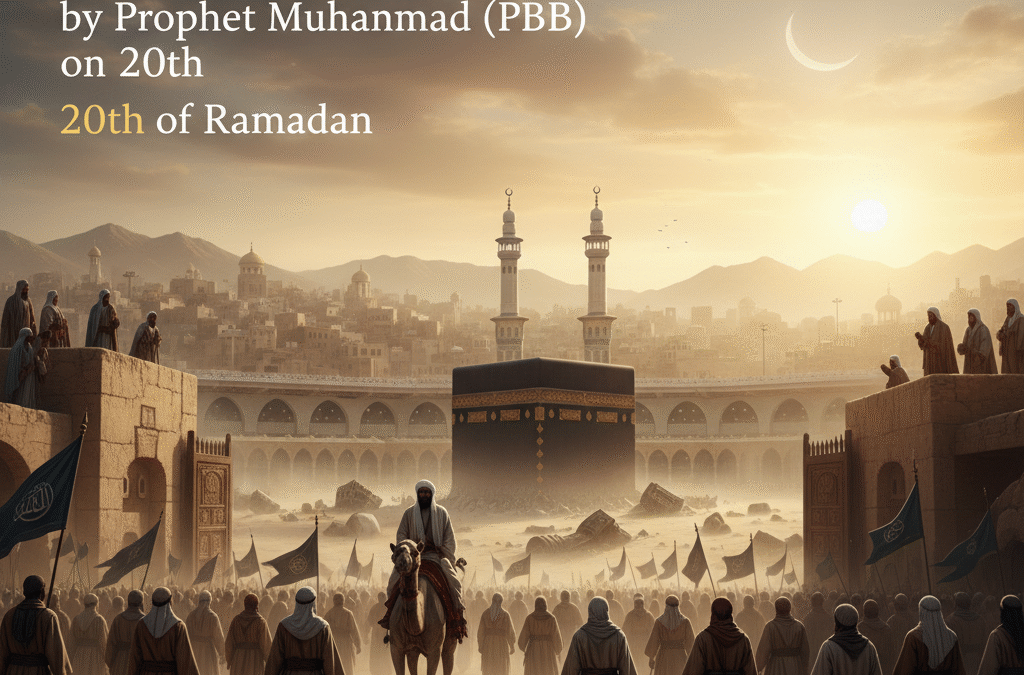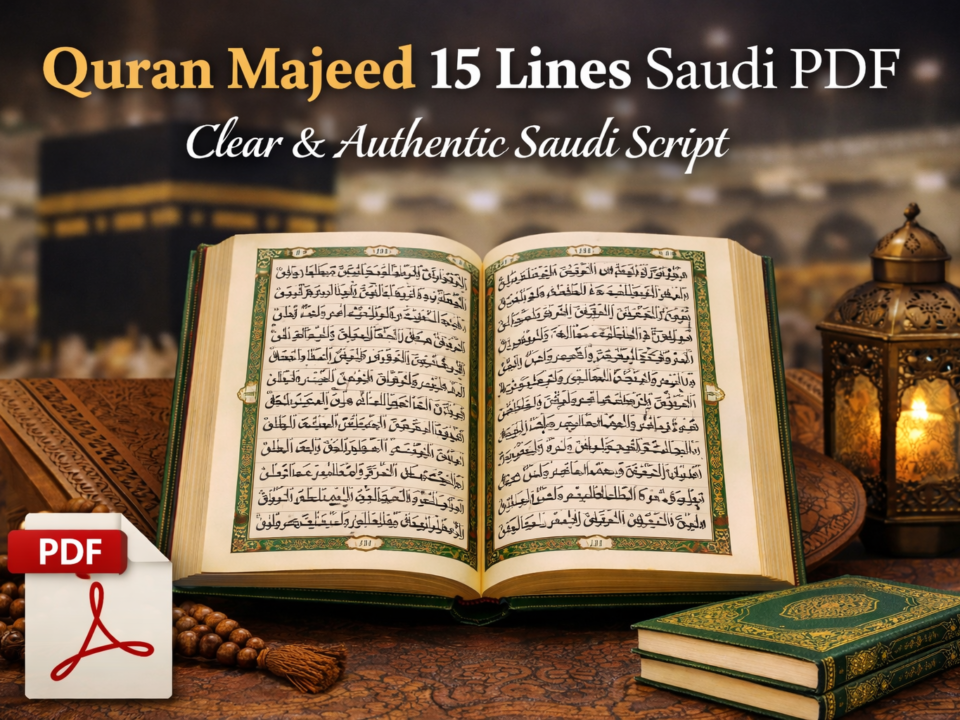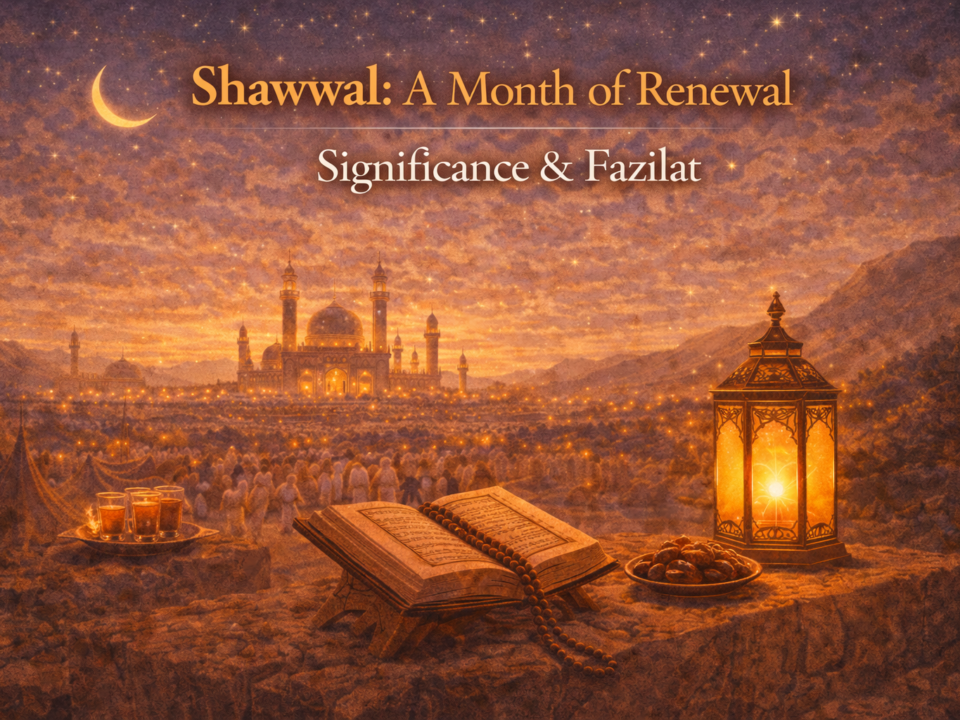The Triumph of Faith: The Conquest of Makkah by Prophet Muhammad (PBUH) on the 20th of Ramadan
Introduction
The 20th of Ramadan is a date etched in the annals of Islamic history as a day of immense significance and rejoicing. On this day, Muslims commemorate the momentous event known as the Conquest of Makkah, a historical turning point that marked the triumph of faith and the return of Prophet Muhammad (peace be upon him) to his birthplace. In this blog post, we will delve into the historical context, significance, and lessons from the Conquest of Makkah.The Historical Context
The Conquest of Makkah took place in the year 8 AH (After Hijra), approximately 630 CE. It marked the culmination of years of struggle, diplomacy, and faith-driven perseverance by the Prophet Muhammad (PBUH) and his followers. Makkah held immense religious and cultural significance for the Arabs, as it was the birthplace of the Prophet and the site of the Kaaba, the holiest sanctuary in Islam.Key Aspects of the Conquest:
- Hudaybiyyah Treaty:In the sixth year of the Islamic calendar, the Prophet (PBUH) and his companions signed the Treaty of Hudaybiyyah with the Quraysh of Makkah, which included a ten-year truce. However, violations of the treaty by the Quraysh led to its eventual dissolution.
- Meccan Allies:The Prophet (PBUH) formed alliances with various Arab tribes and sought their support for the impending conquest of Makkah.
- The Conquest:In Ramadan of the eighth year after the Hijra, the Prophet (PBUH) marched towards Makkah with an army of around ten thousand Muslims. Facing minimal resistance, they entered the city peacefully.
Significance and Lessons
The Conquest of Makkah carries profound significance and offers several enduring lessons:- Triumph of Faith:The conquest symbolizes the triumph of faith and the eventual victory of the message of monotheism over idolatry. It demonstrated the power of patience, steadfastness, and unwavering belief in the face of adversity.
- Mercy and Forgiveness:The Prophet Muhammad’s (PBUH) entry into Makkah was marked by a display of mercy and forgiveness. He forgave his former adversaries and offered a general amnesty, exemplifying the importance of forgiveness and reconciliation in Islam.
- Diplomacy and Wisdom:The Treaty of Hudaybiyyah and the subsequent conquest highlight the Prophet’s (PBUH) diplomatic skills and wisdom in navigating complex political situations. It emphasizes the significance of peaceful resolutions whenever possible.
- Unity and Brotherhood:The alliances formed with various Arab tribes underscore the importance of unity among Muslims and the strength that arises from collective effort and cooperation.
- Return to One’s Roots:The Prophet’s (PBUH) return to his birthplace, Makkah, is a powerful symbol of reconnection with one’s roots and heritage, while also reaffirming the principles of Islam.
Conclusion
The Conquest of Makkah on the 20th of Ramadan is a pivotal event in Islamic history, symbolizing the ultimate victory of faith, mercy, and forgiveness. As Muslims commemorate this momentous occasion, they reflect on the enduring lessons it offers. These lessons include the triumph of faith over adversity, the importance of diplomacy and wisdom in resolving conflicts, the value of unity and cooperation, and the significance of returning to one’s roots while upholding one’s principles.The Conquest of Makkah remains an inspirational testament to the unwavering commitment of the Prophet Muhammad (PBUH) and his companions to the message of Islam. It is a reminder of the transformative power of faith and the potential for reconciliation and forgiveness even in the face of longstanding conflicts. The conquest serves as a beacon of hope and guidance for Muslims around the world, encouraging them to strive for peace, justice, and the triumph of faith in their own lives.Quraan.pk reflects on the Conquest of Makkah by Prophet Muhammad (PBUH) on the 20th of Ramadan, a historic triumph of faith, mercy, and forgiveness that reshaped Islamic history.عنوان: ایمان کی فتح: 20 رمضان المبارک کو نبی اکرم صلی اللہ علیہ وسلم کی فتح مکہ
تعارف
20 رمضان ایک ایسی تاریخ ہے جو اسلامی تاریخ کی تاریخ میں بہت زیادہ اہمیت اور خوشی کے دن کے طور پر درج ہے۔ اس دن، مسلمان اس اہم واقعہ کی یاد مناتے ہیں جسے فتح مکہ کے نام سے جانا جاتا ہے، یہ ایک تاریخی موڑ ہے جس نے ایمان کی فتح اور حضرت محمد صلی اللہ علیہ وسلم کی ان کی جائے پیدائش پر واپسی کو نشان زد کیا۔ اس بلاگ پوسٹ میں، ہم فتح مکہ کے تاریخی سیاق و سباق، اہمیت اور اسباق کا جائزہ لیں گے۔
تاریخی سیاق و سباق
فتح مکہ 8 ہجری ( ہجری کے بعد) تقریباً 630 عیسوی میں ہوئی۔ اس نے پیغمبر اسلام (ص) اور ان کے پیروکاروں کی برسوں کی جدوجہد، سفارت کاری، اور ایمان سے چلنے والی استقامت کی انتہا کو نشان زد کیا۔ مکہ عربوں کے لیے بہت زیادہ مذہبی اور ثقافتی اہمیت رکھتا ہے، کیونکہ یہ نبی صلی اللہ علیہ وسلم کی جائے پیدائش اور کعبہ کا مقام تھا، جو اسلام کا سب سے مقدس مقام ہے۔
فتح کے اہم پہلو:
معاہدہ حدیبیہ: اسلامی کیلنڈر کے چھٹے سال میں رسول اللہ صلی اللہ علیہ وسلم اور آپ کے صحابہ نے قریش مکہ کے ساتھ معاہدہ حدیبیہ پر دستخط کیے جس میں دس سال کی جنگ بندی شامل تھی۔ تاہم، قریش کی طرف سے معاہدے کی خلاف ورزیوں نے اسے بالآخر تحلیل کر دیا۔
مکہ کے اتحادی: رسول اللہ صلی اللہ علیہ وسلم نے مختلف عرب قبائل کے ساتھ اتحاد قائم کیا اور فتح مکہ کے لیے ان سے تعاون طلب کیا۔
فتح: ہجرت کے آٹھویں سال کے رمضان میں رسول اللہ صلی اللہ علیہ وسلم نے تقریباً دس ہزار مسلمانوں کے لشکر کے ساتھ مکہ مکرمہ کی طرف کوچ کیا۔ کم سے کم مزاحمت کا سامنا کرتے ہوئے وہ پرامن طور پر شہر میں داخل ہوئے۔
اہمیت اور اسباق
فتح مکہ بہت زیادہ اہمیت کا حامل ہے اور کئی پائیدار اسباق پیش کرتا ہے:
ایمان کی فتح: فتح ایمان کی فتح اور بت پرستی پر توحید کے پیغام کی حتمی فتح کی علامت ہے۔ اس نے صبر، استقامت اور مصیبت کے وقت اٹل یقین کی طاقت کا مظاہرہ کیا۔
رحمت اور بخشش: نبی اکرم صلی اللہ علیہ وسلم کا مکہ مکرمہ میں داخلہ رحم اور عفو و درگزر کا مظاہرہ تھا۔ اس نے اپنے سابقہ مخالفین کو معاف کر دیا اور اسلام میں معافی اور مفاہمت کی اہمیت کو واضح کرتے ہوئے عام معافی کی پیشکش کی۔
سفارت کاری اور حکمت: معاہدہ حدیبیہ اور اس کے بعد کی فتح پیغمبر اکرم (ص) کی سفارتی صلاحیتوں اور پیچیدہ سیاسی حالات کو آگے بڑھانے میں حکمت کو نمایاں کرتی ہے۔ یہ جب بھی ممکن ہو پرامن قراردادوں کی اہمیت پر زور دیتا ہے۔
اتحاد اور بھائی چارہ: مختلف عرب قبائل کے ساتھ بنائے گئے اتحاد مسلمانوں کے درمیان اتحاد کی اہمیت اور اجتماعی کوشش اور تعاون سے پیدا ہونے والی طاقت کو اجاگر کرتے ہیں۔
اپنی جڑوں کی طرف واپسی: نبی اکرم صلی اللہ علیہ وسلم کی اپنی جائے پیدائش مکہ میں واپسی، اسلام کے اصولوں کی توثیق کے ساتھ ساتھ اپنی جڑوں اور ورثے کے ساتھ دوبارہ تعلق کی ایک طاقتور علامت ہے۔
نتیجہ
20 رمضان المبارک کو فتح مکہ اسلامی تاریخ کا ایک اہم واقعہ ہے، جو ایمان، رحمت اور بخشش کی حتمی فتح کی علامت ہے۔ جیسا کہ مسلمان اس اہم موقع کی یاد مناتے ہیں، وہ اس سے ملنے والے پائیدار اسباق پر غور کرتے ہیں۔ ان اسباق میں مشکلات پر ایمان کی فتح، تنازعات کے حل میں سفارت کاری اور حکمت کی اہمیت، اتحاد اور تعاون کی قدر، اور اپنے اصولوں کو برقرار رکھتے ہوئے اپنی جڑوں کی طرف لوٹنے کی اہمیت شامل ہیں۔
فتح مکہ پیغمبر اسلام (ص) اور ان کے ساتھیوں کی اسلام کے پیغام کے لیے غیر متزلزل عزم کا ایک متاثر کن ثبوت ہے۔ یہ ایمان کی تبدیلی کی طاقت اور دیرینہ تنازعات کے باوجود مفاہمت اور معافی کی صلاحیت کی یاد دہانی ہے۔ یہ فتح دنیا بھر کے مسلمانوں کے لیے امید اور رہنمائی کی ایک کرن کا کام کرتی ہے، انہیں امن، انصاف اور اپنی زندگی میں ایمان کی فتح کے لیے جدوجہد کرنے کی ترغیب دیتی ہے۔



